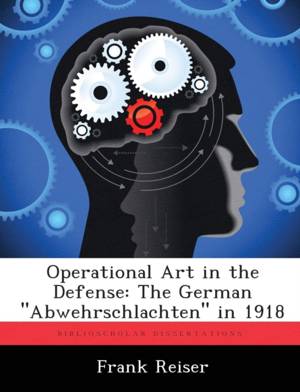
- Afhalen na 1 uur in een winkel met voorraad
- Gratis thuislevering in België vanaf € 30
- Ruim aanbod met 7 miljoen producten
- Afhalen na 1 uur in een winkel met voorraad
- Gratis thuislevering in België vanaf € 30
- Ruim aanbod met 7 miljoen producten
Zoeken
Operational Art in the Defense
The German "Abwehrschlachten" in 1918
Frank Reiser
Paperback | Engels
€ 54,45
+ 108 punten
Omschrijving
The stalemate in World War I created the need for a solution to escape this resource intense form of warfare. Following five unsuccessful German offenses in early 1918, the Germans found themselves in a solely defensive scenario conducting defensive battles, named "Abwehrschlachten." Based on the findings of previous research on these offensives, the monograph analyzes German operational thinking and the display of operational art in the subsequent defensive scenario from the last unsuccessful offensive in July 1918 to the armistice in November 1918. The paper relies on two approaches. First, it analyzes data from primary sources to identify changes in the strategic context from a German perspective, by using a model from Collin S. Gray, and derives implications for the German ability to apply operational art. Second, it reflects German military actions during the "Abwehrschlachten" upon a framework of operational elements, derived from the previous case study of David T. Zabecki on the German offensives. The analysis results in a confirmation of previous findings about the level of German operational thinking at that time, but also depicts the limitations the Germans faced in their attempts to apply their thinking through military action. Those limitations predominately emerged from significant changes in the operational environment in 1918. Current consensus, in line with Clausewitz's thoughts on the defense, is that the defense, tied to a negative aim, is a temporary form of warfare and military leaders always strive to seize the initiative to transit to the offensive form of war-fighting, tied to a positive aim. Based on the analysis of this solely defensive scenario from a German perspective, the monograph questions the applicability of today's understanding of operational art in such a purely defensive scenario and suggest the evolution towards a framework for operational art in the defense.
Specificaties
Betrokkenen
- Auteur(s):
- Uitgeverij:
Inhoud
- Aantal bladzijden:
- 54
- Taal:
- Engels
Eigenschappen
- Productcode (EAN):
- 9781288295098
- Verschijningsdatum:
- 13/11/2012
- Uitvoering:
- Paperback
- Formaat:
- Trade paperback (VS)
- Afmetingen:
- 189 mm x 246 mm
- Gewicht:
- 113 g

Alleen bij Standaard Boekhandel
+ 108 punten op je klantenkaart van Standaard Boekhandel
Beoordelingen
We publiceren alleen reviews die voldoen aan de voorwaarden voor reviews. Bekijk onze voorwaarden voor reviews.











